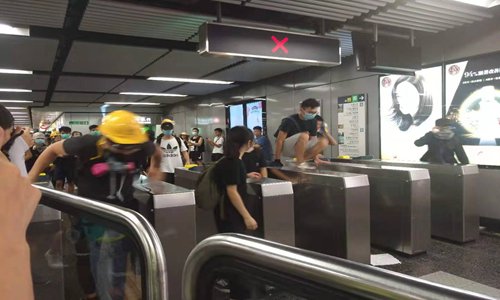HOME >> CHINA
MTR faces backlash for protest role
By Chen Qingqing in Hong Kong and Wang Wenwen in Beijing Source:Global Times Published: 2019/8/22 21:33:41
Provided free extra train for radicals to leave

Protesters jump over turntiles at an MTR station on August 11. Photo: Wang Wenwen/GT
Hong Kong's major public transport network, the Mass Transit Railway (MTR), is facing a public backlash for its role in the radical protests despite the MTR saying it "regretted" for the incident on Thursday.
Many wonder if the MTR will become another Hong Kong International Airport, which saw the assault of two mainland residents by violent protesters and cancelation of hundreds of flights for two consecutive days.
On Wednesday night, groups of protesters damaged public property at Yuen Long Station, seriously disrupting public transport following a standoff with the police outside the station. As always, they ignored warnings from the police and continued to provoke police by striking batons, spraying fire extinguishers and setting up barricades inside the station.
In a statement issued on Thursday, MTR expressed "regret" for the incident and said that blocking the entrances, using fire extinguishers without authorization, spraying graffiti on the wall and damaging facilities was unacceptable. It said it had called the police to handle the case.
But what triggered public outcry was that after the standoff, the MTR provided an extra train to send protesters away for free. On popular Chinese social media platform Sina Weibo, the hashtag "MTR escorting black-clad protesters" attracted 150 million readers as of press time.
Shelter for violence
Wednesday was not the first time that black-clad protesters took aim at public transportation.
On August 11, protesters gathered at Kwai Fong MTR station and engaged in violence, prompting the police to fire tear gas inside the station. Many passengers, journalists, and the rail operator urged the police to consider public safety, while the police said they were only enforcing the law with minimum force, as what protesters did threatened public safety.
On July 30, protesters gathered in some of Hong Kong's busiest subway stations and caused the suspension of several trains by obstructing train doors.
Several petitions signed by so-called MTR train captains to support this non-cooperation campaign across the city have been widely circulated on social networks such as Telegram and LIHKG.
Some MTR conductors also reportedly threatened to go on strike as a way of expressing their disappointment over an incident at the Yuen Long station on July 21.
When protesters illegally assembled in different districts over the past weekends, many of them used MTR trains. Wearing masks and helmets, some protesters vandalized the CCTV cameras inside the stations.
When protesters took the subways to change their venues for demonstrations, they did not have to swipe their pre-paid, rechargeable cards because some turnstiles were left open for them. When the protesters got off at their destination, they just jumped over the exit turnstiles.
No one has been held responsible so far.
Commentator He Liangliang of Hong Kong's Phoenix TV said that the MTR, a public-owned company, monopolizes public transport, so it is responsible for smooth and safe operations. However, He noted that the MTR's indulgence of violence has made the transport network a tool of violent protesters to gather and disperse.
"It is obvious that the MTR management stands with rioters. That is why staff supporting them do not get punished. This reflects the leadership is confusing right from wrong in such critical matters," He said.
Is MTR a victim?
Lam Wai-keung, chairman of the Hong Kong Federation of Railway Trade Unions, has told media that the MTR is investigating whether staff revealed weak spots in its operations to protesters to teach them how to disrupt train services. He said he was told by the management that it was very difficult to find those responsible for the leaks.
On Thursday, in an interview with the Global Times, Lam said MTR staff had also become the target of violent protesters, which not only hurt the employees psychologically and physically in some cases, but also posed risks to public transport safety.
Some maintenance staff were beaten by violent protesters, who also hurled insults at them, Lam said.
Lam said protesters also questioned why operations personnel let police get into the station.
"You have to call the police when they think you should, and you shouldn't call the police when they think you should not," Lam said. "This is ridiculous."
Union vice-chairman Tam Kin-chiu told the Global Times that he was bullied by opposition people because he once objected to the strikes. His personal information, including name and phone number, was leaked on the internet and used by others to apply for loans.
"Now I'm afraid that they disturb me when I drive the train, which will affect not only me but also the passengers," Tam said.
Lam believes that even when protesting, people should voice their opinions through legal and rational ways, not by venting their anger.
"It is not what is supposed to occur in a rational and democratic society," Lam stressed.
Fan Peng, a research fellow at the Institute of Political Sciences of the Chinese Academy of Social Sciences, said that the MTR management officials used public resources to protect and cover the crimes of those protesters. "This is not what Hong Kong, a city ruled by law, should look like."
"Public services organizations like the MTR should understand that the rule of law fits Hong Kong's best interests," Fan said. "If public institutions indulge violence, the tradition of the rule of law that the protesters claim they are fighting for will be trampled on."
Leng Shumei contributed to the story
Posted in: POLITICS,HK/MACAO/TAIWAN